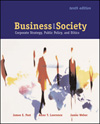 |  Business and Society: Corporate Strategy, Public Policy, Ethics, 10/e James Post,
Boston University
Anne T Lawrence,
San Jose State University
James Weber,
Duquesne University
Stockholders and Corporate Governance
Chapter Summary- Individuals and institutions own shares of corporations as a means of economic gain. Social purposes sometimes guide investors, as when certain businesses are avoided because of their negative social impacts. Shareholders are entitled to vote, receive information, select directors, and attempt to shape corporate policies and action.
- The corporate governance system is the relationship among directors, managers, shareholders, and sometimes creditors. It determines who has legitimate power and how this power can be exercised. Corporate governance has changed in recent years. Newly assertive institutional investors and boards of directors have challenged the authority of top management.
- Activists have influenced corporate actions in some cases through social responsibility shareholder proposals, although such proposals rarely gain enough votes to pass.
- Employee stock ownership programs (ESOPs) give employees a stake in the financial success of a company and may enhance worker commitment and productivity.
- Some observers argue that the compensation of top U.S. executives is justified by performance and that high salaries provide a necessary incentive for innovation and risk taking in a demanding position. Critics, however, believe that executive compensation is too high. In this view, high pay hurts firm competitiveness and undermines employee commitment.
- Insider trading is illegal and unethical. It benefits those with illicitly acquired information at the expense of those who do not have it. Ultimately, it undermines fairness in the marketplace.
|
|




 2002 McGraw-Hill Higher Education
2002 McGraw-Hill Higher Education